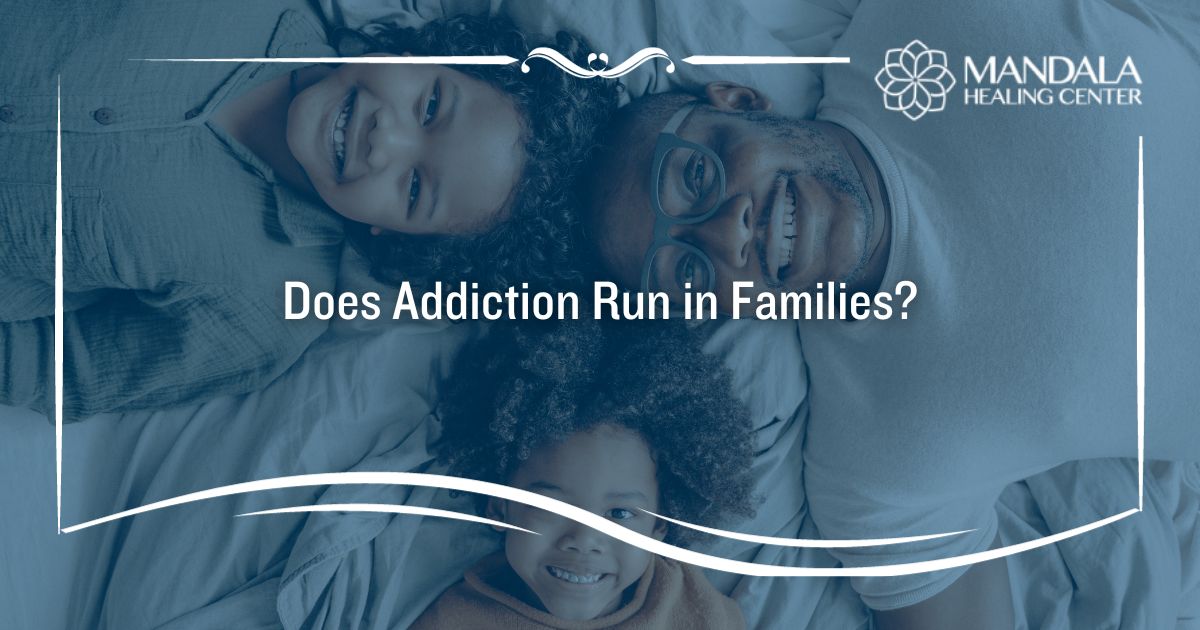Drug and alcohol addiction can have profound effects on people’s lives, including their mental and physical well-being and social health. Addiction can also affect every member of a family and drastically change the dynamics within groups of people who love each other.
Many people wonder about how an addiction develops. What roles do family members have in addiction–and is addiction genetic or environmental?
This article will explore the role of genetics and family history in the development of addiction and the effects substance abuse can have on family systems. If you or someone in your family requires treatment for addiction, reach out to the Mandala Healing Center specialists to learn about our holistic substance abuse treatment programs.
Does Addiction Run in Families?
Research shows that having a parent or other close relative with substance abuse or addiction increases a person’s risk of developing these conditions. If you have a family member with addiction, you might wonder if you are at increased risk of developing a problem with drugs and alcohol as well. But does addiction run in families, or are there other factors involved?
Biological parents pass genes down to their children, and children can inherit some genetic conditions from their parents. Genes are part of DNA that determines specific traits like height and hair color. Biological parents pass down about 50% of their genes to their offspring. Research suggests that about half of a person’s risk of addiction may come from their genes.
However, addiction is a multifaceted condition with roots in many aspects of a person’s life. Genetics may play a role in substance abuse and addiction, but it is not the only thing that may determine a person’s risk for these conditions.
Experts who study genetics believe that a person with a family history of addiction may inherit genes that make them more likely to develop addiction. However, they also think people’s behaviors, health, and environment may be equally–or even more–important in determining their overall risk.
What Other Factors Influence the Risk of Addiction?
Genetics may play a role in addiction, but it is not the only factor that can increase a person’s risk. Here are some other risk factors believed to contribute to an addiction.
Early adverse life experiences
People who experience traumatic or stressful events, such as neglect, abuse, or the death of a parent during childhood, may be more likely to turn to drugs and alcohol to cope with their emotional pain later in life.
Environment
Growing up in communities where drug and alcohol use are normalized may increase a person’s likelihood of developing a substance use disorder later.
Mental illness
Some mental health conditions, including personality disorders, depression, schizophrenia, and bipolar disorder, are associated with a greater likelihood of substance abuse and addiction.
The Effects of Addiction on Family Systems
If you’re wondering, ‘Does addiction run in families?’, your family has likely been affected by substance abuse. When one person in the family lives with drug and alcohol abuse or addiction, every family member is involved. Addiction can fundamentally change the way that people interact with their loved ones, and it can change the dynamic within an entire family system.
Here are some of the ways drug and alcohol addiction affects families.
Neglected responsibilities
People with drug and alcohol addiction often struggle with the responsibilities of daily life. People who use drugs and alcohol may be unable to care for children, attend school, work, or manage day-to-day duties like paying bills, shopping and cooking, cleaning, and more. As a result, other family members may feel neglected or frustrated or take on the caretaker role.
Financial and legal problems
Families share many aspects of life, including an addicted person’s financial and legal woes. When an addicted person blows through savings accounts, gets tangled up in the legal system, or faces other life-altering legal and financial problems, everyone in the family lives with the stress and consequences.
Marital problems
Drug and alcohol abuse are huge stressors within a marriage. Alcoholism can cause significant problems, including:
- Conflicts
- Violence
- Infidelity
- Financial problems
- Legal issues
- Stress
- Not sharing household responsibilities equally
- Jealousy
- Resentment
Substance abuse is often a significant factor contributing to divorce or the end of a relationship.
Codependency
Codependency develops in relationships where one member is addicted to drugs or alcohol. In some cases, the healthy partner of an addicted person will take on the role of a caretaker. They will stretch themselves thin, trying to compensate for their addicted partners’ deficits and shortcomings. In time, much of their identity will become tied up with caring for their addicted partner, which can make them feel needed but is ultimately unhealthy.
Find Addiction Treatment Now
Are you wondering, ‘Is addiction genetic?’ Trying to understand addiction shows that you care about recovery. If you or someone you love needs help to overcome addiction, you are not alone. Effective, holistic treatment is available at the Mandala Healing Center.
Call our admissions team now to learn about our effective substance abuse treatment programs or to find support at any stage of your recovery. Our programs are designed to support addicted people and their families, allowing everyone to heal and move forward into a healthier future.












